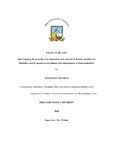Please use this identifier to cite or link to this item:
https://cris.library.msu.ac.zw//handle/11408/3563| Title: | Interrogating the procedure for suspension and removal of elected councilors in Zimbabwe and its impact on devolution and independence of local authorities | Authors: | Muchini, Innocent | Keywords: | Governance Devolution Power Political power |
Issue Date: | 2018 | Publisher: | Midlands State University | Abstract: | The concept of devolution has gained considerable currency in contemporary good governance discourse. Devolution of powers to localized political and administrative units of the State is a means to achieve development, a tool for democracy and a means to achieve good governance. This dissertation interrogates the procedure for the suspension and removal of councilors from office in Zimbabwe and its impact on devolution and independence of the local authorities. A critical comparative analysis of the procedures adopted in Zimbabwe and South Africa is made with a view to determine if the Zimbabwean procedures comply with best international practices. The dissertation begins by analyzing the devolution concept focusing on its theoretical foundations and undertakes a brief analysis of the devolutionary systems in some African States in order to put the Zimbabwean procedures into proper perspective. The dissertation examines the procedure that is used in Zimbabwe in the suspension and removal of elected councilors from office in terms of the Constitution, Statute, policy and practice in order to examine the development in the devolutionary system from independence to the current constitutional period. The dissertation notes that the current statutory provisions still give too much discretion to the central government Minister in the procedures of suspending and removing elected local government officials from office. It concludes that this wide discretion is inimical to the ideals of devolution. The dissertation makes a comparative analysis between the Zimbabwean procedures and the South African procedures to determine if the Zimbabwean procedures are compliant or not with best international standards. South Africa is selected as a comparator because it shares a similar legal, political and social background with Zimbabwe. Both countries share a Roman-Dutch common law tradition, both gained independence from a colonial history of oppression under which the white minority who formed central government enjoyed political and economic advantages at the expense of the majority indigenous peoples who resided in the local communities. Both countries have adopted Constitutions wherein devolution is provided for. The dissertation undertakes an overview of the South African legal framework for the suspension and removal of councilors from office and notes that it gives more powers to local authorities in the decision making of matters affecting their running and management. The Code of Conduct empowers the Speaker, the MEC and the council to institute disciplinary processes against errant councilors. Central government plays a very limited role in this regard. The members of the local community in South Africa have a significant input in the making of decisions that affect them in the suspension and removal of councilors. The dissertation concludes by noting that the current Zimbabwean procedures do not promote devolution and undermine the independence of local authorities. It proposes practical recommendations which address the identified weaknesses in the legal system. It is argued in conclusion that the adoption of the dissertation’s recommendations in the procedures used in the suspension and removal of councilors from office will enhance devolution in Zimbabwe and ensure the independence of local authorities from central government. | URI: | http://hdl.handle.net/11408/3563 |
| Appears in Collections: | Master of Laws: Constitutional and Human Rights Law |
Files in This Item:
| File | Description | Size | Format | |
|---|---|---|---|---|
| R177643F Final dissertation.pdf | Full Text | 751.41 kB | Adobe PDF |  View/Open |
Page view(s)
820
checked on Feb 15, 2026
Download(s)
2,384
checked on Feb 15, 2026
Google ScholarTM
Check
Items in MSUIR are protected by copyright, with all rights reserved, unless otherwise indicated.



